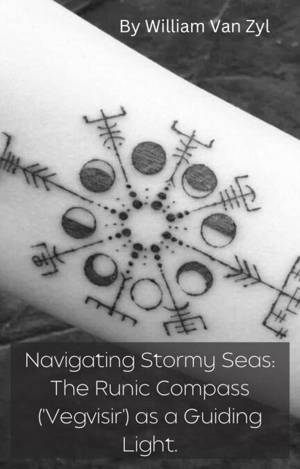
- Retrait gratuit dans votre magasin Club
- 7.000.000 titres dans notre catalogue
- Payer en toute sécurité
- Toujours un magasin près de chez vous
- Retrait gratuit dans votre magasin Club
- 7.000.0000 titres dans notre catalogue
- Payer en toute sécurité
- Toujours un magasin près de chez vous
Navigating Stormy Seas: The Runic Compass (Vegvisir) as a Guiding Light. EBOOK
William Van ZylDescription
'Call me Agnarok'.
Let me tell you about that fateful day in the Winter of 1016.
A primal tempest, a symphony of chaos, bellowed its fury upon the Viking longship, an ageing behemoth defiantly marked by the snarling dragon carved upon its bow. In their unrestrained wrath, the heavens flung bolts of lightning that violently shattered the abyss beneath, revealing a sea possessed by a maddened tumult. The ocean was fuming; its mouth frothing.
Thunder rolls, lightning strikes, and the hammer flies across the sky. Somewhere on the violently unsteady ship, a Viking called to Thor....................
I have included the dramatic introduction to set the scene of a Viking ship in a tumultuous storm. The Viking seafarers were desperate to survive the elements.
Did you recognise the similarity to the opening line of Herman Melville's famous novel Moby Dick?
'Call me Ishmael.' (Moby Dick)
The context of this article is the World of Vikings and navigation in life. Let's look at the vegvisir in more detail.
A true story:
A work colleague of mine - who became a good friend over 2 years ago - was farewelled the other day (2023). He had recently tattooed a Norse name around his left forearm. Yes, you have guessed it: the Norse had an alphabet. This friend, let me call him Agnarok, has a passion for all things Viking and Norse. I made him a farewell card with a drawing of Runic Compass on the front and a couple of special words on the inside. Here are some of the words from the card.
In Norwegian:
Vi ønsker deg alt godt for fremtiden. *(godt = well)
In English:
We wish you all the very best for the future.
This short eBook looks at the Viking's Runic compass - called a vegvisir - and navigation.
Spécifications
Parties prenantes
- Auteur(s) :
- Editeur:
Contenu
- Langue:
- Anglais
Caractéristiques
- EAN:
- 9798223645924
- Date de parution :
- 02-11-23
- Format:
- Ebook
- Protection digitale:
- /
- Format numérique:
- ePub

Les avis
Nous publions uniquement les avis qui respectent les conditions requises. Consultez nos conditions pour les avis.






